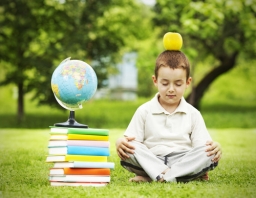Tips for Back to School Nutrition and Physical Activity
Wednesday, September 7, 2016 - 08:15

While this has been an exciting summer in sport, September brings us back to the classroom. This time of year reminds us that it is time to return to learning and it’s time to consider the best way to fuel the body and mind to optimize school lessons and the learning environment. How can we give our youth the best combination of healthy nutrition and active lifestyles to fuel them for learning?
Nutrition
Getting back into the school routine can be challenging for families with kids of all ages. Summer has generally meant a time to relax some of the rules and forego some of the routines. There are some great suggestions to help your family get back into the nutrition routine and it won’t take a lot of time.
- Take some time on weekends or evenings to pre-plan the lunches or dinners for the week. Create shopping lists based around these menu plans. And when you get home, do any pre-packing prep that can be done in advance (chopping veggies, creating snack-sized portions, packing leftovers for lunch, etc.)
- Encourage the kids to get involved with lunches and dinners. Give them structured choices, making sure you have a good variety of food groups covered. Let them experiment with different food combinations. Even teens can get into the spirit by giving them some control over what they take for lunch and even letting them learn to plan and execute an evening meal as an option.
- Eat dinner as a family and at a good time. While this may not always be an option with busy after-school/work schedules, eating dinner as a family encourages healthy eating habits for all members of the family. If the family can’t be together at the dinner hour, try saving part of the meal for a later time so that you can still get together and share the day’s happenings.
Physical Activity and Sport
Engaging in sport and physical activity is an important tool in maintaining a healthy mind and body. Engaging in sport can also create opportunities for social interaction and learning new skills.
- Lead by example by participating in a sport or physical activity you enjoy. Seeing parents who are physically active creates a norm with in the whole family. Find a sport or activity that each person enjoys or find one that the whole family can pursue together.
- Playing sport and being physical active at school has been linked to an increase in academic achievement. Studies show that kids participating in sport leads to higher self-esteem, improved social skills, fewer depressive symptoms, higher confidence and feelings of competence.
- Encourage older youth to choose a sport or activity club at school. It can help them meet new friends, keep them engaged in the school environment (helping to prevent dropout), and promotes positive behaviour and attendance.
Sleep
Eating right and getting exercise is a great start in creating a balanced lifestyle, but don’t forget the sleep part of the equation. Tired kids may not be as able to absorb the learning they face during the day. Well-rested children and youth can better handle learning new concepts, making decisions and coping with the social pressures of a busy school.
- Kids who are physically active tend to sleep better and those that sleep better have more energy to be active. This is true from the youngsters as well as the teens.
- Getting enough sleep can help manage hyperactivity and increase attention span. Chronic sleep loss is also linked to higher rates of depression.
This time of year definitely doesn’t mean the end of fun, incorporating physical activity, sport and fun food boosts everyday health and builds a strong foundation for academic achievement.
References
It’s back to school time! 10 tips to make this school year healthier. EatRight Ontario. Retrieved from the Internet September 1, 2016.
LeBlanc A. (2015). How physical activity affects a child’s academics. Retrieved from the Internet September 1, 2016.
Get the students moving! Physical activity and the classroom. (2015). SIRC Blog. Retrieved from the Internet September 1, 2016.
Are Canadian Kids Too Tired to Move? (2016). ParticipACTION: Physical Activity Report Card. Retrieved from the Internet September 1, 2016.